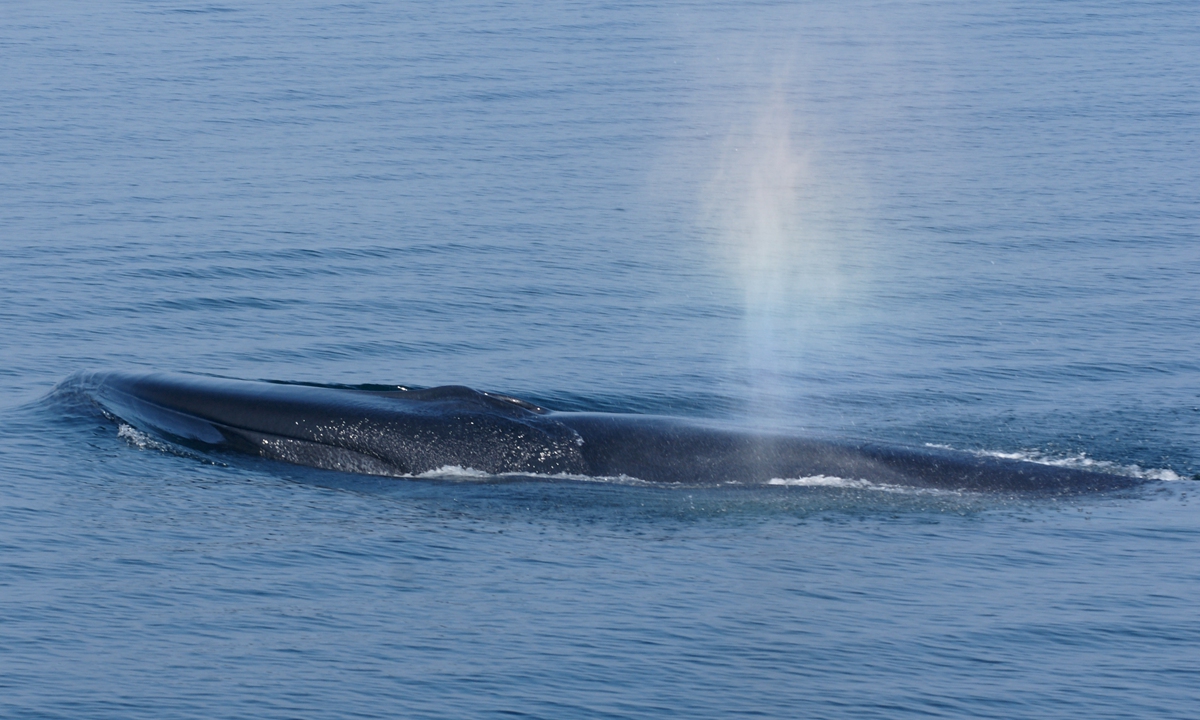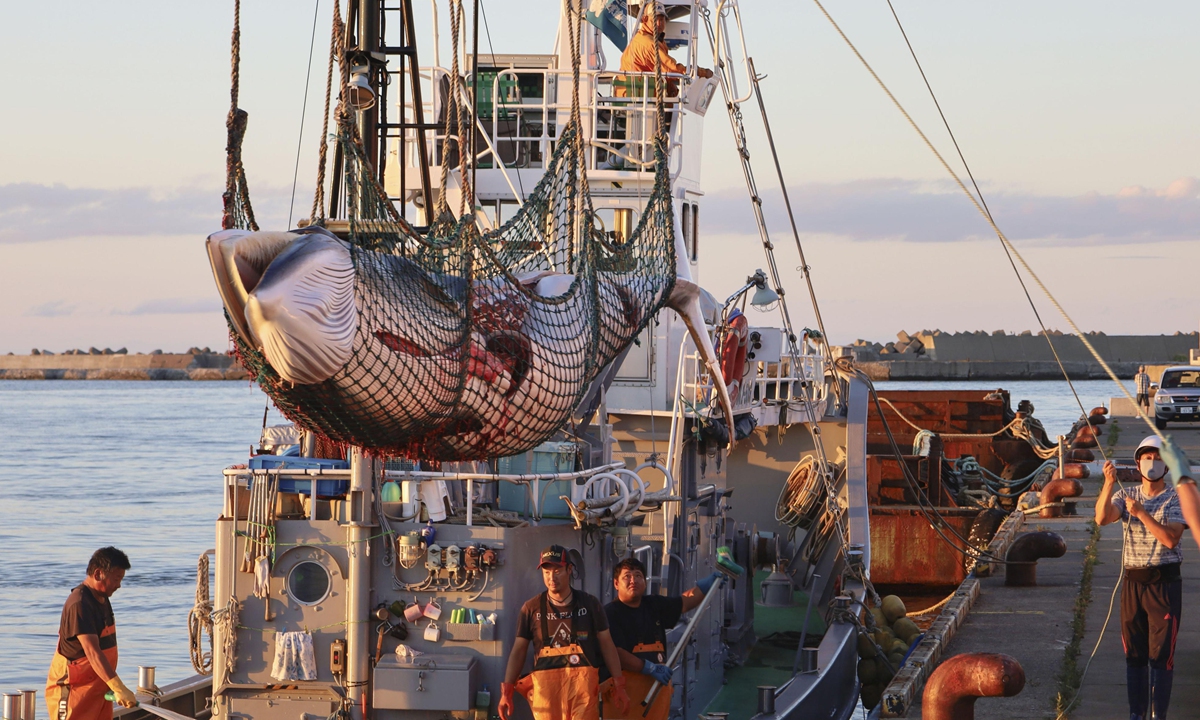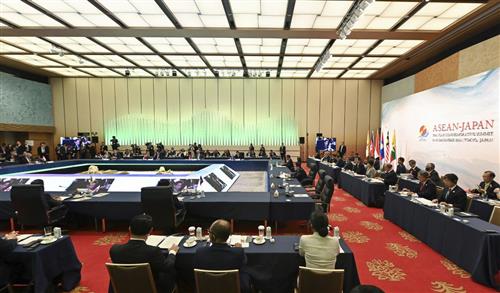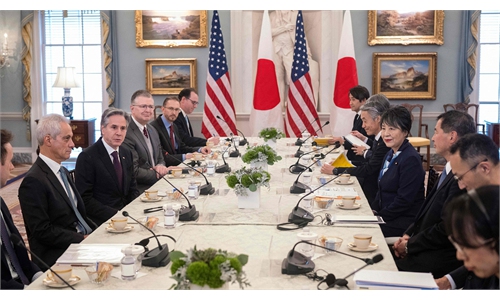Global community protests against Japan’s expansion of whale hunt
Greedy marine expedition

Fin whale Photo: VCG
Emitting a distressing cry through the air, a male fin whale with a length of over 20 meters and a weight of over 55 tons was captured off the coast of Iwate Prefecture, Japan in early August. Everything happened so suddenly, leaving behind its final silhouette on the sea, gazing up at the sky and bidding farewell to the ocean that nurtured its growth. What awaited it were cold blades and greedy diners.
This marks Japan's resumption of commercial fin whale hunting after around 50 years.
According to public data, fin whale catches began to decline after the peak of commercial whaling in 1962. By 1974, less than 1,000 fin whales were being caught. In response to calls for a ten-year moratorium on commercial whaling, an international body known as the International Whaling Commission (IWC) adopted a New Management Procedure in 1974.
Now, one of only three countries to hunt whales commercially, along with Norway and Iceland, Japan added fin whales to a catch list that already includes minke, Bryde's and sei whales, AFP reported.

A minke whale is unloaded from a vessel at a port in the Hokkaido city of Abashiri, northern Japan, on August 16, 2020. Japan resumed commercial whaling in 2019. Photo: VCG
Commercial whaling in Iceland and Norway has been facing international criticism. In June, the BBC, citing a recent survey, reported that more than half of Icelanders are against commercial whaling. The news report noted that most of the whale meat is exported to Japan.
According to media outlets, the Japanese government in late July officially approved hunting of up to 59 fin whales for 2024 in its commercial hunt, which is confined to the country's economic zone.
Animal protection organizations, natural resources departments and the wider public in the international community have been outraged by the decision, given that fin whales are considered by the International Union for Conservation of Nature to be "vulnerable to extinction." Whales, as a crucial link in the marine food chain, play a vital role in maintaining the stability of the ocean ecosystem.
'Whales don't belong to Japan'
In an exclusive written reply from the Japanese whale conservation group IKAN, formally known as Iruka & Kujira (Dolphin & Whale) Action Network, the organization told the Global Times that they have recently issued joint statements opposing commercial fin whaling, along with dozens of other environmental protection organizations at home and abroad, including those from the US, Brazil, Australia, Germany, Chile and Denmark.
Fin whales are a species that is still in the process of recovering from past overexploitation, and there has been no official evaluation of their population numbers yet, Nanami Kurasawa, executive director of IKAN, told the Global Times via e-mail.
Kurasawa pointed out that Japan's decision to add the new species to its hunt list is mainly to allow whaling companies to generate more revenue, and it will not be internationally understood.
"Whales don't belong to Japan," Kurasawa emphasized.
The IKAN representative also refuted claims by some Japanese officials and some media outlets that the reason for including fin whales back into commercial hunting is that the number of fin whales in the waters has increased. "There is no clear public information on their population numbers," Kurasawa stated, noting that there are doubts among whaling scientists over the data for the species recently provided by the Japanese Fisheries Agency.
Also, according to Kurasawa, it is certain that coastal whalers are finding it increasingly difficult to capture minke whales - of which Japanese whalers capture hundreds each year.
Kurasawa, citing a scientific review panel on the fin whale, warned that a catch quota of 60 fin whales per year could potentially lead to depletion.
The media team of Australia's Department of Climate Change, Energy, the Environment and Water forwarded a media release about this matter to the Global Times.
According to the media release, Tanya Plibersek, Australian minister for the Environment and Water, said the Australian government is "deeply disappointed" by Japan's decision to add the world's second-largest whale species to the list.
"Australia is opposed to all commercial whaling and urges all countries to end this practice," said Plibersek, noting that Australia will continue to advocate for the protection and conservation of whales and the health of the ocean for future generations.
The Guardian reported on August 1 that Darren Kindleysides, a whale campaigner and chief executive of the Australian Marine Conservation Society, called the hunts "inhumane, cruel and unnecessary."
New ship for more prey
When it comes to the issue of whaling, Japan finds itself in opposition to almost the whole world, but it still does nothing about it.
According to Reuters, whale consumption in Japan peaked in the early 1960s. Japan drew criticism from environmental groups for launching what it called scientific research whaling in 1987, following an IWC regulation that banned commercial whale hunts.
In order to legalize their whaling activities, they withdrew from the IWC in July 2019. Australia and New Zealand were among the nations that expressed disappointment when Japan declared its withdrawal from the IWC, Reuters said.
Japan caught a total of 294 minke whales, Bryde's whales and sei whales last year, according to Japan's Fisheries Agency in May.
In order to facilitate commercial hunting, a new $48 million whaling ship, the Kangei Maru, was launched on May 21, and it aims to catch 200 whales by the end of this year.
"We are proud of catching whales and are very proud of this ship which will allow us to begin offshore mothership-style whaling this year," Hideki Tokoro, an employee of Japanese whaling company Kyodo Senpaku, was quoted as saying by CNN in June.
The Kangei Maru is bigger and faster than its predecessor, the company says, and it's equipped with state-of-the-art drones able to travel a reported 100 kilometers (62 miles) to allow crews of smaller boats to quickly locate and kill whales, according to CNN.
Whales play a crucial role in the marine ecosystem. When whales die in the sea, their giant bodies usually sink to the seafloor and begin a new life, nourishing an entire ecosystem of deep-sea creatures.
Now equipped with a better ship, Japanese whalers are embarking on a journey for more prey, which again arouses wide concern from the international community.
Faced with this aggressive Japanese whaling, environmentalists are worried that the ecological balance of the ocean is now facing an even bigger challenge.



